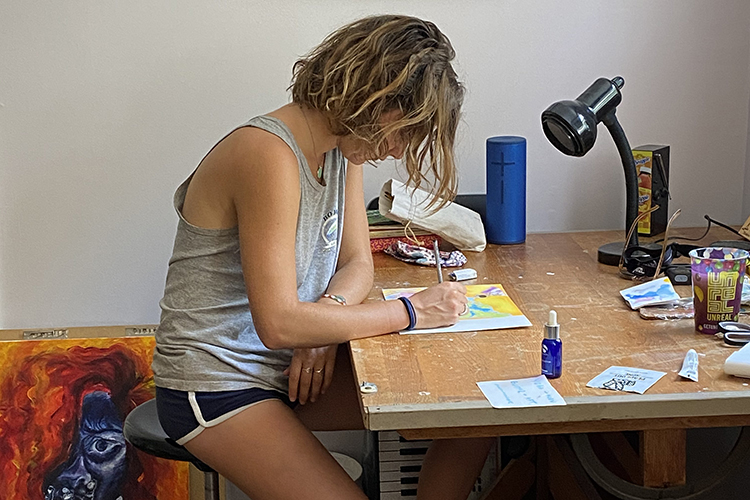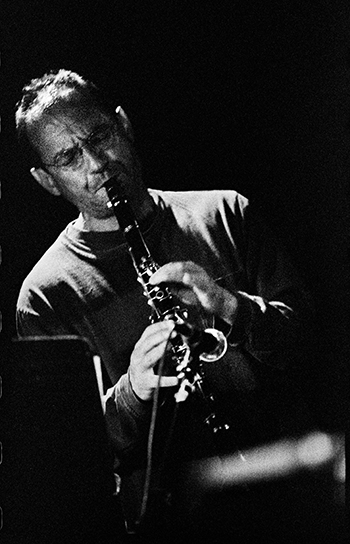Jazz improv class, lecturer produce COVID-19 era albums
Remotely-made 'Cool It' and 'Plague Diary' assignment: 'Use what you've got'
August 13, 2020

Maggie Camillos, a student vocalist last semester in “Jazz Theory and Performance,” a Department of Music course, led the design of this cover for “Cool It,” an album she and her classmates co-produced while attending Berkeley remotely. (Image by Maggie Camillos)
When COVID-19 hit, the 16 students in UC Berkeley lecturer Ben Goldberg’s jazz studies class were transcribing and learning to play the work of the late American jazz saxophonist and composer Charlie Parker, who would have turned 100 this month.
After instruction went remote, they couldn’t play as an ensemble on Zoom; the app best transmits sound from one user at a time. So, Music 116: “Jazz Theory and Performance,” with its emphasis on improvisation, and improvising together, turned to listening sessions, lectures and individual meetings.
But Goldberg then took a creative leap and assigned his students, sheltered in place in their homes, to co-produce an album. Inspired by Parker’s creative genius, the group came up with “Cool It,” a collection of compositions by the Morrison Bedroom Experiment — a name the students chose for themselves. The album is free for the listening.
“I am crazy about the record,” said Goldberg, an influential Bay Area jazz clarinetist and composer who’s recorded more than 30 albums of his own. “I feel that we took a potentially ruined semester and instead created something of lasting beauty and importance.”
Some of the students’ compositions have names evocative of their feelings of isolation: “Quarantine Conversations,” “Hymn as One,” “Something Outta Nothing” and “The Space Between.”

“We are in an unprecedented era,” said Berkeley lecturer, clarinetist and composer Ben Goldberg. “None of us knows what’s going to unfold or how long it will last.” But being isolated in a pandemic brings opportunities, he added. After the success of his students’ shelter-in-place album, he’ll repeat the assignment this fall — “unless we’re given the OK for a concert!” he said. (Photo by Jeremiah Cymerman)
The album title, “Cool It,” stems from what Goldberg tells students at the end of class. “He always says something like, ‘All right guys, we should probably cool it for the day,’” said Gabe Sarnoff, who played the upright bass in the course and will be a senior this fall, continuing to attend Berkeley from his hometown, Los Angeles.
Sarnoff said the name Morrison Bedroom Experiment came from Morrison Hall, home of the Department of Music, and because the students made the album — “definitely an experiment” — in their respective bedrooms.
The experiment was so moving to Goldberg, who’s taught this two-semester class for five years, that, on March 19, he began his own quarantine album — “Plague Diary.” Goldberg strives to add to it a song a day, each an original piece he composes and records at his home in Berkeley. There are now more than 120 tracks, all of them free.
Goldberg said keeping a musical diary has helped him get past the shock of the cancellations on his usually busy calendar of musical performances.
“Like many musicians, concerts are my life blood. I can barely think about how much I miss playing for people,” he said. “When all my concerts and tours were suddenly canceled, I was faced with the question of how to keep the music alive.”
During the pandemic, “I suppose, like everyone, my moods have ranged all over the place,” he added. “For me, it’s been everything from cozy optimism to bleak worry. But I’m glad I stumbled on this project, because it has given me meaningful work, every day.”

The “Cool It” album project was built “out of the given conditions — us unable to be together physically (as a class),” said Maggie Camillos, who graduated in May. “It definitely left a mark on me, in terms of working to not only make the most out of any scenario, but digging deeply, and creatively, into the possibilities any scenario offers you.” (Photo by Melissa Glen)
Maggie Camillos, a physical geography major, was the lone vocalist in the jazz improv class. Most of Goldberg’s students aren’t music majors, but they must audition to get in. Camillos’ dad is in a rock band, and she studied jazz in high school, despite being devoted primarily to visual arts.
“I decided to minor in music in college so that it would be a bigger part of my life, with a focus on singing,” she said. Camillos, a May 2020 graduate, signed up for Goldberg’s class to learn music theory, as well as to connect with other student musicians.

Student Gabe Sarnoff said that working on the “Cool It” album taught him “that you do not have to stranglehold your composition. … It is OK to … allow the song to form somewhat independent of you.” (Photo by Daniel d’Olimpio)
Sarnoff chose the course in hopes of having fun with music again. He said he’d lost interest after taking a few classes that felt more like music boot camp and led him, out of stress, to change his major from music to cognitive science. But after taking Music 116, he returned to majoring in music, as well as in cognitive science.
He said his favorite part of Goldberg’s class was when students first arrived and weren’t allowed to talk, “because Ben wanted the first sounds in the room to be musical.” Once they’d set up their instruments, the group would sit silently until someone played the first note — at first, it was Goldberg, but students got braver with time.
“From that,” said Sarnoff, “the class delved into a free improvisation for about 10 minutes … a loud, beautiful chaos.”
Despite the chaos of the ensuing coronavirus, Goldberg’s remote album assignment was a test of what Camillos called “the fundamental principle of the class — to explore the musical possibilities from your given conditions, and keep getting better at it.”
Or, as Goldberg puts it, “Use what you’ve got.”

During the pandemic, with musicians no longer able to perform for crowds, “Something told me that art would be fine, even though humans are in trouble at the moment,” said Berkeley music instructor Ben Goldberg. (Photo by Peak)
For starters, that meant the students had to complete their album assignment using whatever they had on hand at home — a microphone, an instrument, recording equipment or just a smartphone.
Each student developed a concept for a composition, then sent instructions to everyone else about what parts they needed to play and record. Those recordings then were sent back to the composers, who made music from the results — what Goldberg called “scraps, that are then creatively assembled and take the form of a quilt.”
The crucial component of the assignment, said Sarnoff, who created “Emotion Locomotion” for the album, “was that we didn’t give each other insight into what our concepts were. Each student completed the instructions blindly, without knowing what they were contributing to.”
Camillos produced sung or spoken sound clips for her peers’ compositions. For the second half of her own piece, “The Space Between,” she said she asked everyone to “sound like the universe,” to evoke “ … the space, the force, the essence of being that ties us all together.”
To her amazement, the test worked — not just for her own composition, but for the entire “Cool It” album. Despite the “huge bummer” of losing their physical connection, an integral part of improvisation, she said, “we each seemed to have a sense for the larger thing we were all a part of, … and to realize that creativity is at our fingertips, wherever we are.”
That’s what Goldberg’s discovering, too, in producing “Plague Diary” with his B flat clarinet, contra-alto clarinet and E flat Albert system, along with a synthesizer and two guitar pedals.
“There’s always more than one idea,” he said, of each new day. “The job, I am discovering, is in deciding which ideas to pursue.”
Especially in periods of uncertainty and isolation, said Goldberg, it’s the artist’s duty “to apply the full force of the imagination to the present moment, … to what is only possible under the restrictions of the quarantine. Then, what’s recorded is a true document of this extraordinary time.”